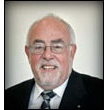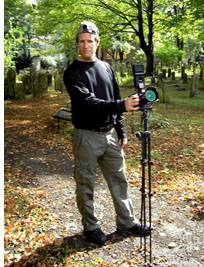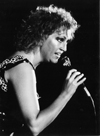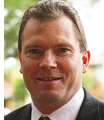|
Time for change at
the
JNF helm in Australia
 SYDNEY, July 2- The Jewish National Fund (JNF) has elected a new federal executive to be headed by community stalward Grahame Leonard (pictured at right) SYDNEY, July 2- The Jewish National Fund (JNF) has elected a new federal executive to be headed by community stalward Grahame Leonard (pictured at right)
Melbourne-based Leonard, the immediate past president of the Executive Council of Australian Jewry (ECAJ) succeeded Sydney-based Ron Fester in the position.
"I am committed to a unified and whole-of-organisation approach to our endeavours" Leonard told last week's federal JNF conference in Sydney. "I am also committed to our federal
structure that spells out clear roles for each of the parts, which in aggregate make us whole" he said.
Leonard acknowledged the importance of working with JNF's Israel-based head office Keren Kayemet to address various projects in Israel, while emphasising that JNF Australia should have wide selection of projects ready to be implemented. "Our challenge is to build on the organisation's achievements that contribute so much to the quality of life and secure, sustainable development in israel".
In the foreseeable future, Leonard believes the focus should be on the Negev region, including the Arava. This should include research that examines the water challenge an in turn facilitates settlement in the Negev.
Photographer slams Community Security Group's policy
 MELBOURNE, July 3-A Jewish photographer attempting to document synagogues around the world has criticised Australia's community security institutions for "inflexible and underhanded" policies. MELBOURNE, July 3-A Jewish photographer attempting to document synagogues around the world has criticised Australia's community security institutions for "inflexible and underhanded" policies.
Jono David (at right) is a Japan-based freelance photographer with a website that displays artistic photos of Jewish buildings all over the world.
"My mission is to contribute to the preservation of Jewish communities by documenting them photographically," he wrote in an open letter to the Jewish community.
David sent 80 emails to synagogues and communityorganisations around Australia. Initially, he received approvals to photograph the inside and outside of buildings, but later the approvals
turned to rejections after the Communal Security Group in NSW and the Community Security Group in Victoria sent out warning letters.
It is understood the security groups did not believe that David himself was a security threat.
Instead, they were concerned that photos featuring internal and external shots of Jewish community buildings in one central location on the internet posed a security risk.
The security groups did not ban organisations from providing access to David, rather they encouraged them to decline his request. This notification left David furious and frustrated.
"I challenge anyone to name a single incident, worldwide, where photographs played an integral part in an attack on a synagogue, or a Jewish institution," he said.
"While I have, on rare occasions, been denied photo requests, I could never have imagined being blacklisted on an entire continent."
In his initial email to community organisations, David did indicate that he was sensitive to security concerns and would not photograph surveillance cameras, exits or entrances, offices or corridors.
He said in a statement he hopes Australian community organisations will come around, adding that he has planned a trip here in August and September of 2010.
"A hypersensitive security measure is a victory for the terrorists, but by photographing a vibrant community, the Jewish people win," he said.
David's comprehensive website, features around 18,000 photos. His collection includes images of Jewish war graves in Tobruk,
Libya, the street sign for Jews Street in Cochin, India and photos of the interior and exterior of the New London Synagogue.
To see two examples of David's works, please click here.
New taste for Melbourne's
kosher diners
MELBOURNE, July 3 - Melbourne's kosher scene is growing again, with two new cafes opening recently. The Laffa Bar and Charcoal Grill will cater for fleisig diners, while the Shemesh
Vegetarian Pizza will serve those who are into milchig dining.
Yankel Wajsbort from Mizrachi Kosher Australia confirmed that both are his organisation's kashrut supervision. "We tell all the kosher eateries that if you prices are decent and quality good, the you will do well" he said. Another kosher establishment is also currently in the pipeline.
Wajsbort encuraged the Jewish community to patronise the new venues, saying that without community support the establishments will not survive. But another recent kosher fine dining restaurant appears to have shut its doors after
opening earlier in the year. It is understood that the closure is the result of a business dispute between the partners who operated the restaurant.
Israel dances to Melbourne beat
 MELBOURNE, July 5- a local Jewish woman's rendition of Yerushalayim shel zahav has inspired a renowned Israeli choreographer to create a new dance. MELBOURNE, July 5- a local Jewish woman's rendition of Yerushalayim shel zahav has inspired a renowned Israeli choreographer to create a new dance.
 Participating in Machol Israeli Dance Club's recent weekend camp, choreographer Yoram Sasson (at right) heard Aura Lipski (at left) singing Naomi Shemer's classic song during an informal sing-along. Participating in Machol Israeli Dance Club's recent weekend camp, choreographer Yoram Sasson (at right) heard Aura Lipski (at left) singing Naomi Shemer's classic song during an informal sing-along.
"I asked Aura to repeat the song because I heard something really special in her voice which gave me an idea for a new dance," Sasson said. "So we moved everybody to the dance floor and started to pull all the movements together."
Machol's director Shula Goldberg said Lipski was at first a bit surprised by Sasson's reaction, "but Aura was thrilled when he added the new dance to his repertoire and asked her to record her version of the song".
The dance, to Lipski's rendition of Yerushalayim shel zahav, has since been added to Sasson's repertoire and taught to European dancers at an event in Austria.
"Melbourne is one of the powerhouses of Israeli dancing outside Israel," Goldberg said. "But we've never had a visiting choreographer create a new dance here."
Sasson, one of Israel's younger generation of choreographers, visited Australia last month to participate in Machol's camp and to teach classes and workshops to Melbourne's hundreds of keen Israeli dancers.
Countdown to the Maccabiah Games
 SYDNEY, June 29-The countdown to the 18th Maccabiah Games is well and truly on, after NSW Premier Nathan Rees (at right) bid adieu to the Sydney members of the squad at a function at Governor Macquarie Towers on June 22. SYDNEY, June 29-The countdown to the 18th Maccabiah Games is well and truly on, after NSW Premier Nathan Rees (at right) bid adieu to the Sydney members of the squad at a function at Governor Macquarie Towers on June 22.
Rees hailed the Games as a "great sporting event," before telling the 200-strong NSW contingent that "you go to these games with the blessing and good wishes of every sports-loving Australian".
The Premier told the audience, clad in their green and gold tracksuits, that the Games are an opportunity for the competitors to promote "our skills, diversity and way of life to the rest of
the world," but above all Maccabiah is a "unique celebration of faith."
"The Maccabiah Games are an expression of Jewish pride," he said. "Pride of a great and indestructible faith pride in the story of the Jewish people, their fortitude and strength and
pride in the story of modern Israel."
Rees reflected fondly on his trip to Israel last year, when he led a delegation for the Australian-Israel Chamber of Commerce, which he described as "one of the most extraordinary
events of my life. It had a profound impact on me."
Australia's head of delegation Tom Goldman added that for the 8000 athletes from 60 countries, the 18th Maccabiah Games will
Go to top of right column
|
|
provide a lifetime of memories.
"For each participant at the Maccabiah Games, they are two weeks to experience, and a lifetime to remember. For many the Maccabiah provides a significant connection to Israel and for some, Judaism itself," he said.
"It provides us with an opportunity to connect with Jewish contemporaries from around the far reaches of the world in the land of Jewish roots and inspires an awakening of Jewish life."
Five-time participant Bert Rosenberg beamed when talking of his excitement at travelling to Israel again, this time for the Masters 75-80 Tennis competition.
"Yes, very excited," he enthused. It'll be a family affair for the Rosenbergs in July, with Bert's sons Lance and Justin, and grandson Matthew all competing at the Games. It's the
first time he'll be joined by youngest son Justin, who will contest opens tennis.
Husband and wife duo Peter and Tammy Keller will try their hand in the mixed doubles competition.
The Masters competitors are also making their Maccabiah debut, and are just as excited as all the young kids going for the first time.
"I'm looking forward to it," Tammy said. "The opening ceremony should be amazing."
Also champing at the bit are the squad's juniors. The green and gold will boast a healthy contingent across basketball, football, futsal, tennis, swimming and netball, as well as in gymnastics, karate and athletics.
Tasmanian Law Reform Institute report stirs circumcision debate
 HOBART—Discussions about the pros and cons of circumcision are back on the table after a recently released Tasmanian report suggested there could be serious legal implications in carrying out the procedure. HOBART—Discussions about the pros and cons of circumcision are back on the table after a recently released Tasmanian report suggested there could be serious legal implications in carrying out the procedure.
It has been variously called a mitzvah and a mutilation. Circumcision, or brit milah, was in the news again recently after the Tasmanian Law Reform Institute raised questions over the legality of the age-old practice.
The report questioned whether parents were able to consent to their son's circumcision - a medical procedure that is considered, in most cases, to be elective and non-therapeutic.
"The crux of the uncertainty is whether the consent of the parent of a male infant being circumcised can provide protection from criminal and civil action brought against a person for performing a circumcision," Tasmanian Law Institute's Professor Kate Warner (above right) said.
But Jewish medical professionals, including a mohel and a senior rabbi, have rejected the report's findings. Criticism ranged from calling the report ignorant of religious practice to
saying the Tasmanian Commissioner for Children, who requested the report, has a "bee in his bonnet about circumcision".
All warned that circumcision was not a risk-free procedure, but agreed that if performed responsibly by an experienced practitioner, there were few concerns.
Dr Robert Lewin, a Sydney Jewish doctor, who has performed more brits than he can count over the past 15 years, said that parents of newborn baby boys were often anxious about a brit. This is why, he said, the role of the mohel was also one of part-
counsellor.
"Parents are constantly anxious because there is always a tension between knowing a baby has to have a brit and putting themselves through the process," Dr Lewin said. "Part of the job of the mohel is to carry the parent through it."
According to Rabbi Meir Shlomo Kluwgant, president of the Rabbinical Council of Victoria, parents do ask from time to time about the procedure. "But brit milah is so deeply
entrenched and cemented in the very essence of the Jewish identity, that as a general rule, mothers and fathers participate unquestioningly," Rabbi Kluwgant said.
Professor Frank Oberklaid, director of the Centre for Community Child Health at Melbourne's Royal Children Hospital and professor of paediatrics at The University of Melbourne, said circumcision certainly had medical benefits. However, these benefits were not remarkable enough in Australia for circumcision to be widely used as a preventative measure.
"It has been shown to prevent sexually transmitted diseases. That is particularly relevant in communities that have very high incidences of HIV-AIDS, not in Australia, but in
sub-Saharan Africa for example," Prof Oberklaid.
"There you could make a case for routine preventative circumcision, but not in Australia."
In fact, a 2007 United Nations World Health Organisation (WHO) report recommended parents circumcise their baby boys. The WHO report indicated circumcised men were 60 per cent less likely to contract the HIV virus than their non-circumcised counterparts.
In terms of the negative aspects of circumcision, Prof Oberklaid said complication figures remain relatively low for the surgical procedure. The most common complications relate to infections or excessive bleeding. However, the most overlooked element of circumcision is the baby's pain.
"It is not a procedure you undertake lightly, it is not like cutting your hair or cutting your nails," he said.
Prof Oberklaid, one of Australia's foremost paediatricians, said the view that the baby is fine because he only cried for a minute is no longer acceptable.
"There are recognised ways of minimising the pain," he said. He listed a dose of paracetamol before the procedure, local emla anaesthetic cream or having baby suck as tried and true pain minimisation techniques.
"The sucking action itself seems to decrease the amount of distress the baby feels, as does giving them high levels of sugar -- and that's why traditionally you put sweet wine on your finger or a dummy dipped in honey."
As well as complications from the actual procedure, the Tasmanian report suggested circumcised males could find they were unhappy with the procedure, which they did not request for themselves.
"The significance of the impact of feeling acted upon against your wishes, or best interests, is particularly important in the context of infant circumcision," the report reads.
"The high profile cases of attempted suicide and suicide around the world, including in Australia, of men forced to live with lasting complications of circumcision performed on them as a child, are an extreme illustration of the possible devastating consequences of circumcising infants."
But mohel Dr Lewin said he had never come across any grown man who was unsatisfied or ashamed of having been circumcised.
"I think the contrary is very clearly the case," Dr Lewin said. "I think that when you talk to Jewish adult males, they all identify very strongly with a brit."
Rabbi Kluwgant was in agreement, saying he had never come across a Jewish male either who regretted having a brit milah.
"In fact quite the opposite. Brit milah has been occurring for thousands of years, and today, I believe that it is actually quite the norm that children of all faiths and backgrounds are circumcised," he said.
Dr Hugo Gold, a leader in the Children's Bioethics Centre at Melbourne's Royal Children's Hospital, is currently assisting the Royal Australasian College of Physicians in preparing a
review into infant circumcision in Australia.
While the report has not been released, Dr Gold believes the college will retain the status quo when it comes to male circumcision. He added that with the new report from Tasmania, the college would likely revisit the legal implications of circumcision.
"In light of the Tasmanian Law Reform report we may need to have another look at the legal implications because what we were thinking was that the legal implications were not particularly strong and that the law wasn't likely to be
changed in this country," Dr Gold said.
According to the report, there are three broad possibilities when it comes to the future of circumcision in Australia: doing nothing and leaving the law vague, regulating, or legislating.
"The regulation option is of significance to the Jewish community in that it talks about setting standards for non-medical performance of circumcision and registration and licensing," Dr Gold said. "That then would carry some
obligations on the part of circumcisers, most of which are quite sensible and in accordance with standard practice."
"It could be beneficial, the problem with any regulation is that it involves a certain amount of restriction of freedoms, but overall it may be in everyone's best interest if it were regulated."
|

